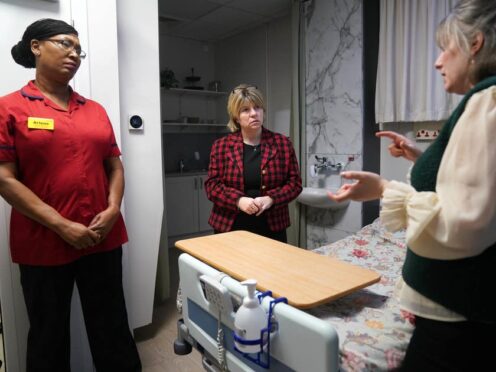
A Government baby loss certificate scheme designed to recognise the grief of parents who lose a baby early in a pregnancy has been launched.
The voluntary scheme offers those who experience a loss pre-24 weeks’ gestation a certificate to formally recognise the devastating impact.
Babies stillborn before 24 weeks do not need to be officially registered, leaving some parents feeling ignored.
The new certificates, which are not compulsory, will be official but not legal documents.
The idea was formed as part of the Government’s response to the independent Pregnancy Loss Review, with parents able to access the free service from 9am today.

The certificates will be available for either parent to access following a loss under 24 weeks since September 2018, with the Government planning to expand eligibility in the near future.
On a visit to a family bereavement centre at the maternity unit, Maria Caulfield, Minister for the Women’s Health Strategy, said parents who lose a baby before 24 weeks can feel there is a “lack of recognition of that baby”.
Speaking at St George’s Hospital in Tooting, south-west London, she said: “Getting an official certificate means a lot.
“Parents feel it’s so important to see their baby’s name on a certificate that they can share with family, and friends and remember that baby.
“We’ve had parents user-testing the system which is why it’s taken a little bit longer to get up and running than we would have liked.
“It’s a very difficult time for parents, even if they don’t do it straight away… so we want to make it as easy as possible.”
The minister was shown around the unit’s specialist bereavement suite, which offers a comforting and private setting for families dealing with the emotional and physical challenges of perinatal loss.

The suite at St George’s was refurbished in October after the family of a baby who passed away after birth raised more than £80,000 towards its renovation.
Not all hospitals have such facilities, and Ms Caulfield was told by midwives on the visit that they should be “standard” in maternity units.
The minister said: “Having a facility like this where mums are not on a maternity ward, where they have the time and space to spend with their baby before they have to leave hospital is crucial.
“Part of our pregnancy loss review is seeing how we can get that as a standard facility in all maternity units.
“There’s a number of things that we can do, that will make a difference, but that is on top of trying to reduce the number of deaths from stillbirths and neonatal deaths in the first place.”
Asked about calls to introduce statutory leave for bereaved parents who have lost a baby before 24 weeks, she said: “We are looking at that.
“As a department, we’re leading the way in supporting employees at the Department of Health and Social Care.
“There’s nothing formal at the moment, but a bit like we’ve done with the menopause, in encouraging employers to look after their staff, both mums and dads. It’s really important.
“Many employers want to support those parents that work for them, but aren’t always sure how to so it’s about raising awareness and showcasing best practice that will really help parents at difficult times.”
Health Secretary Victoria Atkins said: “Losing a baby can be a hugely traumatic event and the introduction of certificates to formally acknowledge the loss of life is a positive step towards better supporting women and parents affected.
“I’d like to thank charities and campaigners for their continuous work in bringing awareness to baby loss and making the certificates launching possible.”
Reacting to the announcement of the scheme, Kath Abrahams, chief executive of Tommy’s, the pregnancy research and baby loss charity, said: “This announcement will be warmly welcomed by many in our community.
“The pain of losing a baby before 24 weeks is often made even worse for bereaved parents because there is no formal recognition of their experience.
“We’re pleased that baby loss certificates will now be available to provide a degree of comfort for at least some of those families.”
But Ms Abrahams said miscarriage remains a “largely hidden problem” because of a lack of Government commitment to gathering statistics on the issue.
“We do believe, however, that more must be done to formally record losses before 24 weeks,” she continued.
“We cannot begin to tackle the wider problem of baby loss without a Government commitment to gather and record UK-wide miscarriage statistics.
“Without data, miscarriage remains a largely hidden problem and isn’t prioritised, despite the tens of thousands of families affected by it every year.”
The new scheme is being launched today in England only, although people in Scotland can already apply to have their loss recorded in the Memorial Book of Pregnancy and Baby Loss Prior to 24 weeks, and receive a certificate of inclusion in the book.

Enjoy the convenience of having The Sunday Post delivered as a digital ePaper straight to your smartphone, tablet or computer.
Subscribe for only £5.49 a month and enjoy all the benefits of the printed paper as a digital replica.
Subscribe